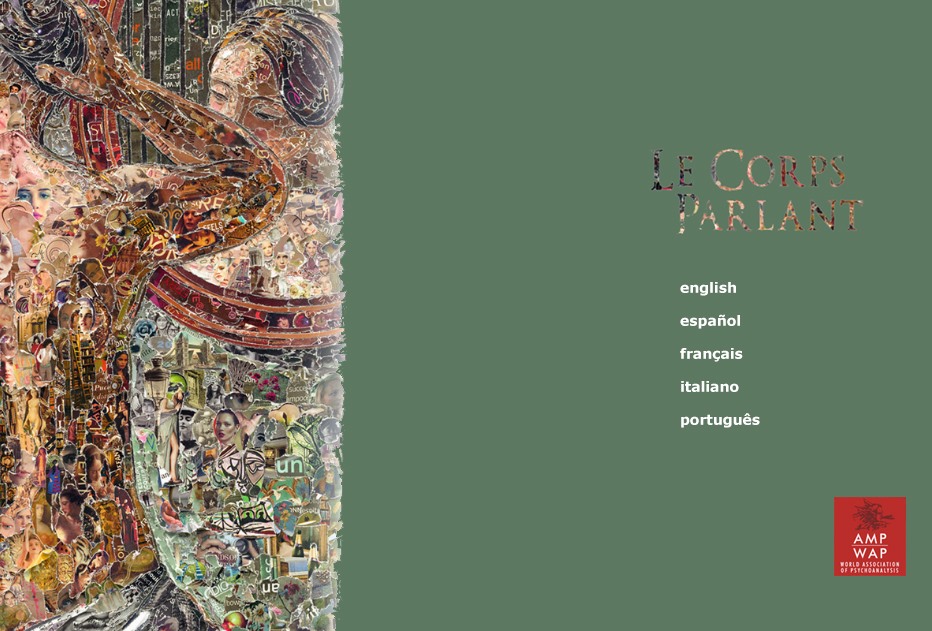

THE SPEAKING BODY
Xth Congress of the WAP,
Rio de Janeiro 2016
451
450
very effect of the master’s discourse– spell it as you will –through being inscribed
solely in castration, which, by this very fact, is properly to be defined as being
deprived of woman– of woman in so far as she would be realized in a suitably
congruent signifier.
Being deprived of woman–this, expressed in terms of the failure (
défaut
) of
discourse, is what castration means. It is indeed because this is not thinkable
that the speaking order institutes this desire, constituted as impossible, as an
intermediary and that makes the mother, in so far as she is prohibited, the
privileged feminine object.”
p. 154
“To express myself in these large-scale, approximate terms, take the male
principle for example –what effect does the incidence of discourse have on it?
It is that, as a speaking being, he is summoned to give an explanation of his
‘essence’– irony, ,inverted commas. It is very precisely and solely because of the
affect that this discourse effect subjects him to –that is, in so far as he receives
this feminizing effect of the small
a
– that he recognizes what makes him, that he
recognizes the cause of his desire.”
p. 160
[S. XX]
“All the needs of speaking beings are contaminated by the fact of being involved
in an other satisfaction –underline the last three words– that those needs may
not live up to.”
p. 51
“
The gap inscribed in the very status of jouissance qua dit-mension of the
body, in the speaking being, is what re–emerges with Freud –and I’m not
saying anything more than him– through the test constituted by the existence
of speech. Where it speaks, it enjoys (
Là où ça parle, ça jouit
). And that doesn’t
mean that it knows anything because, as far as I’ve heard, the unconscious has
revealed nothing to us about the physiology of the nervous system, the process
of getting a hard–on, or early ejaculation.”
p. 114-115
“The ‘I’ is not a being, but rather something attributed to that which speaks.
That which speaks deals only with solitude, regarding the aspect of the
relationship I can only define by saying, as I have, that it cannot be written. That
solitude, as a break in knowledge, not only can be written but it is that which is
written par excellence, for it is that which leaves a trace of a break in being.
That is what I said in a text, certainly not without its imperfections, that I
called
Lituraterre
. ‘The cloud of language,’ I expressed myself metaphorically,
‘constitutes writing.’ Who knows whether the fact that we can read (
lire
) the
streams I saw over Siberia as the metaphorical trace of writing isn’t linked (
lié
–
beware,
lier
(to link) and
lire
consist of the same letters –to something that goes
beyond the effect of rain, which animals have no chance of reading as such? It
seems rather to be linked to that form of idealism that I would like you to get
into your heads– certainly not that professed by Berkeley, who lived at a time
when the subject had acquired its independence, not the idealism that holds
that everything we know is representation, but rather that idealism related to
the impossibility of inscribing the sexual relationship between two bodies of
different sexes.”
p. 120
“I must nevertheless say what there is qua metalanguage, and in what respect it
coincides with the trace left by language. For this is where the subject returns to
the revelation of the correlate of language (
langue
), which is the extra knowledge
of being, and constitutes for him his slim chance of going to the Other, to its
being, about which I noted last time –and this is the second essential point– that
it wants to know nothing. It is a passion for ignorance.
That is why the other two passions are those that are called love –which has
nothing to do with knowledge, despite philosophy’s absurd contentions– and
hatred, which is what comes closest to being, that I call ‘exsisting.’ Nothing
concentrates more hatred than that act of saying in which ex–sistence is
situated.”
p. 121
“For every speaking being, the cause of its desire is, in terms of structure, strictly
equivalent, so to speak, to its bending, that is, to what I have called its division
as subject.”
p. 127
II /a.2 Other publications
Television
(1973),
[TV]
“There is no unconscious except for the speaking being. The others, who possess
being only through being named –even though they impose themselves from
within the real– have instinct, namely the knowledge needed for their survival.”
p. 5
Columbia University: Lecture on the Symptom
(1975). Trans.: A. Price
and R. Grigg
[C/C]
“How is it that, having distinguished this symbolic, this imaginary, and this
real from one another, and having specified them by the fact that the symbolic
is our bond with language, based on this distinction, we are speaking
beings
?
It’s viciously circular to say that we are speaking beings,
êtres parlants
. We are
parlêtres
–a word it would be advantageous to substitute for the unconscious,
Jacques Lacan



















